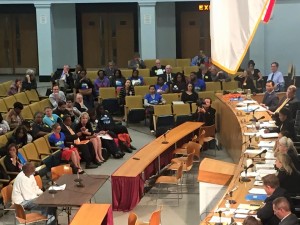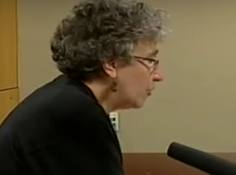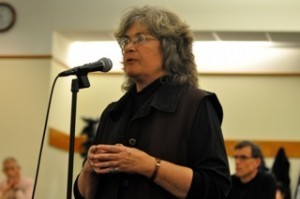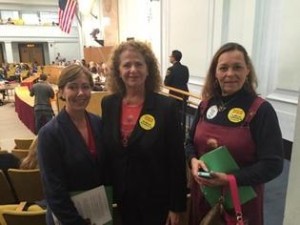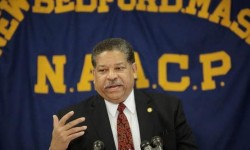It was another marathon State House hearing on the future of public education in the Commonwealth. Some called it a circus, with throngs of bused-in charter parents in matching t-shirts; parents, students, and teachers wearing “Public Funds for Public Schools” stickers; a beaming Gov. Baker with his entourage; and cameras recording the testimony of two opposing visions of education. I kept having visions of The Hunger Games, with Gov. Baker presiding over an arena of combatants, fighting for education resources that dwindle over time, while the needs continue to grow (along with the divide between the state’s rich and poor).
Civil rights icon Mel King, as always, drilled down to the struggle’s essence. Our elected representatives should fight for liberty and justice for all, but they seem content to fight just for some. “This legislation does not set forth justice for all…it’s justice for some folks and not for all folks,” he said. “I’m amazed that the Governor could sit here and push for legislation that is not in keeping with his mandate for all people…not for some of the children but for ALL of the children.”
My own testimony echoed Mel’s point. I cited the Supreme Judicial Court, which “held that the education clause imposes on the Commonwealth an enforceable duty to provide an education for all its children, rich and poor, in every city and town through the public schools. The court said all children. That’s what real public schools do and should do. The record shows that is not what charter schools do.”
Baker et al seem content to pit groups of parents and teachers and students against one another. But like the Hunger Games combatants, we are reluctant warriors, with no particular beef against one another.
As I said in my testimony, “CPS does not blame any individual parents for seeking what they believe to be in the best interests of their children. Nor do we blame young, inexperienced, idealistic teachers who seek and find teaching positions in these schools. But we do hold our state education leaders and elected representatives accountable for making policies that serve the needs of every child in the Commonwealth.”
Yesterday may have seemed to be a marathon in and of itself, but this battle is only just beginning and it will be a marathon, not a sprint. I am so grateful and proud of everyone who came and spoke with passion and conviction and DATA about the need for a moratorium on charter school expansion. (Click here and here for Tracy Novick’s excellent notes to get a flavor of the testimony.)
I am tired but hopeful. After all, how can we lose when we have people power the likes of Mel King, Tito Jackson, Jessica Tang, Tracy Novick, Alain Jehlen, Barbara Fields, Matt Cregor, Juan Cofield, Russ Davis, Ruth Rodriguez, Marlena Rose, Nora Toney, Mary Jo Hetzel, Sandra MacIntosh, Donna Bivens and Roger Rice; Boston parents like Odette Williamson, Heshan Berents-Weeramuni, John Lerner, Karen Kast, Mary Lewis Pierce, Megan Wolf, Mary Battenfeld, Karen Oil, Kenny Jervis and Harneen Chernow; teachers like Rebecca Cusick, Sharon Hinton, and Lucas Donahue; superintendents like Todd Gazda, Julie Hackett, Paul Dakin, Andre Ravenelle, Mary Bourque and Roy Belson; allies like Karran Harper Royal; researchers like Leigh Dingerson; amazing students like Tabi Kast, Savina Tapia and Marcus Wade; union leaders like Barbara Madeloni, Tom Gosnell, Richard Stutman and Steve Tolman, bloggers like Jennifer Berkshire (a k a “EduShyster”), school board members like Carol Doherty, our allies in the legislature and on and on and on?
The wealthy and powerful white men behind the parents in the matching t-shirts have seemingly limitless resources. But as we demonstrated throughout yesterday’s grueling hearing, we are many and we are powerful too.
Here is a sample of the amazing testimony:
*Lucas Donohue, 5th Grade teacher in Watertown Public School and prior charter school teacher, said, “At Mystic Valley, children were treated as an experiment and there was an inherent conflict of interest in their education. Students were kept back based on academic pretexts when letting them continue would cause issues for the school. In general teachers were not consulted on the academic soundness of these decisions. This meant that students, like three that I had, were 14 years old in the sixth grade. They could drive to school in 8th grade. Have you ever been to a middle school with a student parking section? The students retained had one thing in common, all were Haitian, and many spoke Haitian Creole as a first language. Yet they were not given the language support they needed to succeed. As a result, students were retained until their parents took them out and brought them back to the public schools. This served the charter schools well. English Language Learners and students who had difficulty learning did not show up on the state tests, a convenience that should not be understated as the charter is renewed based on state test scores. The school had a conflict of interest and the educational needs of their students was secondary.” Click here for the full testimony.
*Leigh Dingerson, consultant with the Annenberg Institute for School Reform at Brown University, said, “over the last two decades, the dominant policy agenda for the charter movement has focused on expansion and competition, not innovation. Forty-two states now allow chartering, and about 2.5 million students attend more than 6,000 independently managed schools. Almost 2,000 new charter schools have opened in just the past five years, along with a burgeoning market of management service providers, vendors, think tanks, policy associations, and advocacy organizations. Chartering has become an industry. Expansion—not innovation—has become the industry’s top goal.” Click here for the full testimony.
*Craig Kelley, City Councilor in Cambridge, said, “True public schools take all comers. My kids, your kids, everyone’s kids. Kids with severe difficulties and kids who are a dream to teach. They don’t pre-select with targeted advertising and they don’t help students “understand” that they don’t belong there. Public schools have plenty of warts, but, warts and all, they reflect the soul of modern America and the hopes of future America. As long as Charters can pick and choose who actually attends them, as long as Charter Schools continue to represent a narrowly selected band of students, they have little to teach any of us about how to educate the American public. Click here to read the full testimony.
* Mary Jo Hetzel, Coalition for Equal, Quality Education, said, “Charter schools severely deplete the resources available to the existing public schools since the latter are not adequately reimbursed for the loss of funds as students leave, while costs do not decrease. Charter schools receive a disproportionate share of public funding, while serving those students with the least challenging needs. Charter schools regularly dump MJ Hetzel, Coalition for Equal, Quality Education, mjindigo66@gmail.com students that they don’t wish to serve back into the existing public school system, a system that is now starved for resources.” Click here for the full testimony.
*Nancy Everidge, Taunton Education Association President, Carol Doherty, a member of the Taunton School Committee, and Dr. Julie Hackett, Superintendent of Schools in Taunton, said, “Are district schools failing our children? This is the question that is at the heart of the Massachusetts charter school debate. And the answer to that question is a resounding no! As an educator in the Taunton Public Schools, I am proud to share with you today our many successes. Like so many others in our Gateway cities, students in the Taunton Public Schools are receiving the kind of well-rounded education envisioned by you – the members of the Joint Education Committee – and by so many others in the Commonwealth.” Click here for the full testimony.
*Juan Cofield, President of the NAACP New England Area Conference, said, “NEAC recognizes the urgent need to provide high quality education for all students, not only those fortunate enough to win lotteries and attend strong performing charter schools. Proportionately, there are as many strong performing traditional public schools as there are charter schools. We must stop sacrificing traditional public schools students for the few in charter schools. NEAC asks the Legislature to commit itself to finding broad based, effective solutions for immediate, overarching improvements to public education for all students. Further, NEAC asks the Massachusetts Legislature to reject the emphasis on charter schools as the vanguard approach for the education of students, and instead, focus its attention, funding, and policy advocacy on improving low performing public schools and work through local authorities to ensure that all public schools are provided the necessary funding, support and autonomy necessary to educate all students to their highest potential. If we fail to do so, we will enlarge the school to prison pipeline.” Click here for the full testimony.
*John Lerner, Boston Public School parent, said, “I’m constantly hearing the phrase, “Boston has the highest performing charter school sector in the country”. If you only look at test scores that appears to be true, but if you dig deeper and look at how the test scores are obtained, you’ll see something not very pleasant, something that is horribly wrong. The charter high schools in Boston push out an average of 13.5% of a cohort a year. That works out to 40.5% every three years, and guess what? As a result – their test scores and grads to college stats soar.” Click here for the full testimony.
